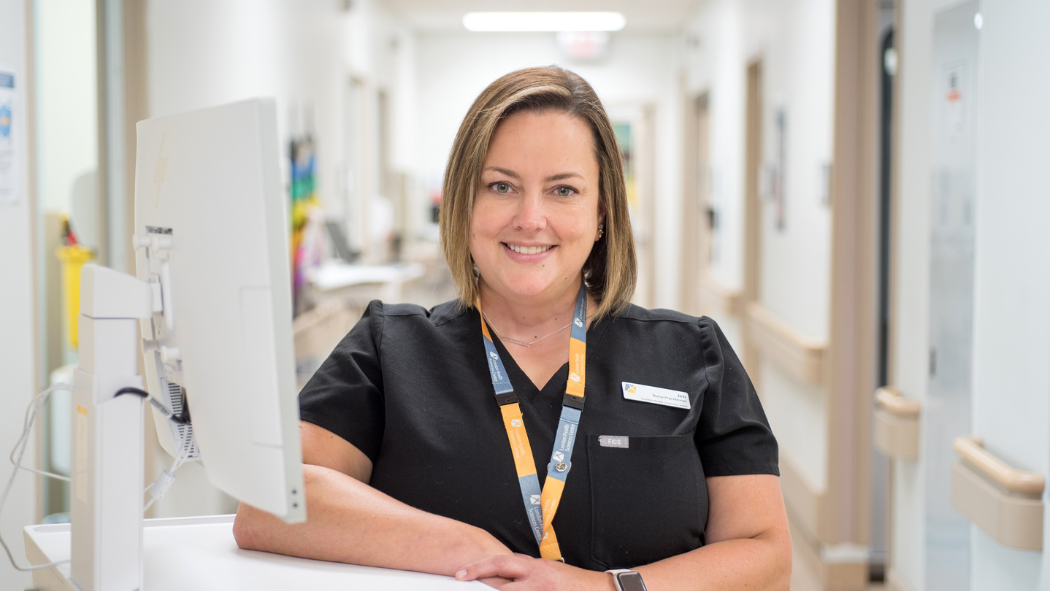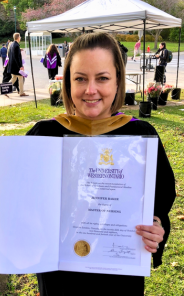
July 24, 2024
By Jen Baker, Nurse Practitioner at LHSC
Role of nurse practitioner at London Health Sciences Centre
Amongst the daily operations at London Health Sciences Centre (LHSC), nurse practitioners (NP) have a dynamic and independent role within various departments. Each day involves collaborating with interdisciplinary teams to deliver the best care to patients, where they utilize advanced assessment skills and their clinical expertise. This role not only enhances patient outcomes and safety but also contributes to professional education and research advancements.
Becoming a nurse practitioner

After graduating from Western’s Nursing Program in 2008, I spent several years working in various registered nursing positions (including some at LHSC) before taking the leap and going back to school to obtain my master's degree and primary care nurse practitioner certificate, which I completed in 2018.
I loved the connections that I made with patients and their families when I was working as a visiting and hospice nurse and I have always been academically driven, so completing an NP program allowed me to combine academic research with the clinical care and patient interactions that I enjoy so much. I always had a sense that I wanted additional challenges in my career but did not want to completely leave bedside care. The NP role is exciting in that it is constantly evolving and still has a great degree of flexibility to include teaching and research on top of a clinical role.
A few years ago, I came across a posting on the LHSC job board for a full-time NP position with the adult Otolaryngology/Head & Neck surgery team. While this area was relatively new to me, I knew from my previous experience that LHSC was a supportive place to work, where a clinical pivot could still be done successfully. My husband and close friends gave me a little push to go for it, even when I was feeling intimidated about pivoting from primary care to acute care. I have now been in this position for just over three years.
Continuing education, skills and opportunities
Leading up to my decision to become an NP, I had great conversations with some of my physician colleagues who reassured me that I had the basic knowledge needed for this role. They explained that I would have a lot of support and teaching to help me expand my knowledge in all things head and neck.
I am encouraged to attend conferences and educational events related to head and neck oncology and attend when I can and when funds are available. I’ve taken continuing education for NPs through the University of Toronto to help build my skills as a primary care-trained acute care NP, and the surgeons on our team are always willing to teach and support my learning. Even at LHSC, I have participated in a peer mentorship program where new nurse practitioners are partnered with another nurse practitioner in the hospital to help with the adjustment to this new position.
Daily impact on lives
Most of our patients in head and neck surgery are dealing with a life-threatening or life-changing cancer diagnosis and are looking for confidence, competence and compassion in their care team. As an NP, I work closely with this team to support patients and their families through their illness, from initial presentation through to survivorship.
I love how my role is an extension of primary care by allowing me to follow patients long-term. I meet them during initial treatment planning and see them through their patient journey, sometimes years past diagnosis in the head and neck cancer survivorship clinic. This lets me build deep relationships, celebrate achievements and support them through challenging times. It's a perfect blend of the clinical challenges of acute care and the long-term relationships of primary care.
Health care is always changing, as is the NP role. I put my trust in the process and continue to set my own personal and professional goals.
The head & neck team is one of the tightest teams that I have ever worked with, where I always feel seen, heard and appreciated. There is a lot of mutual respect among disciplines on our care team, with the common goal of providing outstanding care during what can be a very overwhelming time for patients and their families.
Are you interested in growing your career at LHSC? Check out current opportunities online or connect with the Recruitment Team recruitment@lhsc.on.ca to learn more.
